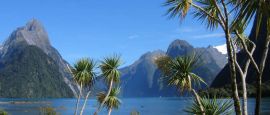New Zealand Food and Drink
New Zealand boasts some superb cuisine, most of which is prepared in the distinctive Pacific Rim style, drawing from the heritage of the cultures in the region. Every region has a speciality and it’s possible to travel around the country sampling them in restaurants, at barbecues, farmers markets and at wine and food festivals. For something truly alternative, head to the Hokitika Wildfoods Festival on the West Coast of the South Island to try huhu grubs, worm sushi and chocolate-dipped chillies.
New Zealand has a reputation as a leading producer of meat and dairy produce with lamb, beef and pork on most menus. Venison is also widely available. A variety of fish, including snapper, grouper and John Dory can be found. Seasonal delicacies such as whitebait, oysters, crayfish, scallops and game birds are recommended. The kumara, a native sweet potato, is a common accompaniment, while kiwi fruit, feijoa and tamarillo are celebrated fruits. Those with a sweet tooth should try hokey pokey ice cream and the national desert, pavlova, a rich concoction of meringue, cream and fresh fruit. New Zealand is also establishing a reputation for French-type cheeses: bleu de Bresse, brie, camembert and montagne bleu.
For a traditional treat, try a hangi, a Maori-style feast cooked in an earth oven under heated river rocks, which often includes chicken, wild boar and lamb, as well as vegetables.
• Kumara (native sweet potato).
• Feijoa (local fruit) and golden-fleshed Zespri Gold, kiwi fruit from the Bay of Plenty.
• Battered fish and chips from Gisbourne.
• Salmon and green-lipped mussels from Marlborough.
• Paua (abalone) from Stewart Island.
• Toheroa (clam) from Ninety Mile Beach.
• Oysters from Bluff.
• Hangi in Rotorua.
Picnic areas with barbecue facilities are provided at roadside sites. Restaurants are usually informal, except very exclusive establishments. Waiter service is typical to that of other Western nations, but self-service and fast-food chains are also available. Some restaurants invite customers to 'BYO' (bring your own liquor). Bars have counter service and public bars are very informal. Lounge bars and 'house bars' (for hotel guests only) are sometimes more formal and occasionally have table service. There is some variation in licensing hours in major cities and some hotel bars open Sunday, providing a meal is eaten. In most hotels and taverns, licensing hours are 1100-2300, except Sunday.
Service charges and taxes are not added to hotel or restaurant bills. Tips are not expected. The size of the gratuity is entirely discretionary, but 5-10% is typical.
New Zealand boasts world-class domestic wines and beers, many of which have won international awards. A wide range of domestic and imported wines, spirits and beers is available from hotel bars, 'liquor stores' and wine shops.
Merlot (Auckland and Wairarapa), Chardonnay (Bay of Plenty, Gisbourne, Wairarapa and Canterbury), Pinot Gris and Noir (Auckland, Wairarapa, Marlborough and Central Otago) and Sauvignon Blanc (Marlborough and Wairarapa) are all locally produced, as well as New Zealand draught beers and lager.
Do you have any Feedback about this page?
© 2026 Columbus Travel Media Ltd. All rights reserved. No part of this site may be reproduced without our written permission, click here for information on Columbus Content Solutions.




 You know where
You know where